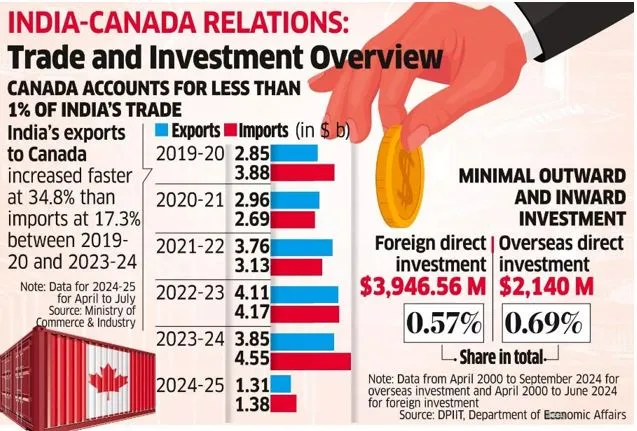

16th October 2024 (13 Topics)
Context
The diplomatic relations between India and Canada have significantly deteriorated since 2018, marked by a series of incidents and statements that highlight growing tensions. Now, India "strongly" rejected Canada's latest "diplomatic communication" against the Indian envoy and other diplomats "in a matter related to an investigation in that country". India's Ministry of External Affairs slammed the Canadian government and accused Prime Minister Justin Trudeau of indulging in "vote bank politics".
Key events that have shaped this strained relationship.
- 2018: Trudeau’s Controversial Visit: Canadian Prime Minister Justin Trudeau visited India, which was intended to strengthen ties but ended up being criticized as a diplomatic disaster. The visit was marred by controversy when a convicted Sikh separatist was invited to a formal event by the Canadian High Commissioner, only rescinded after media inquiries.
- 2020: Farmers’ Protests and Diplomatic Tensions: Trudeau became the first world leader to express concerns about India's farmers' protests, stating he was worried for those affected. This marked the beginning of heightened sensitivities regarding Canada's stance on issues affecting India, leading to mutual distrust.
- 2022: Anti-India Activities and Hate Crimes: India condemned the defacing of the BAPS Swaminarayan Mandir in Toronto with anti-India graffiti and warned Indian nationals in Canada about a rise in hate crimes and sectarian violence.
- 2023: Protests and Security Concerns: A protest outside the Indian Consulate in Vancouver coincided with a manhunt for Sikh separatist Amritpal Singh. Trudeau's national security adviser accused India of foreign interference, while an event glorifying the assassination of former Prime Minister Indira Gandhi further strained relations.
- Nijjar’s Assassination and Diplomatic Fallout: Hardeep Singh Nijjar, designated a terrorist by India, was shot dead in Vancouver. His death incited protests and escalated tensions, leading to accusations from Trudeau that Indian agents may be involved. Canada halted negotiations on a proposed trade treaty with India as diplomatic ties continued to fray over Nijjar's killing.
- Nijjar was a Khalistani separatist who was gunned down on Canadian soil in June 2023. He was a Canadian citizen but a designated terrorist in India. Nijjar supported the Khalistan movement, which is banned in India. Khalistani sepratists talk about an unofficial Khalistan referendum vote seeking a separate Sikh state.
What is the root cause of deteriorating relations?
- There are some 770,000 Sikhs living in Canada, home to the largest Sikh diaspora outside the Indian state of Punjab.
- Sikh separatism - rooted in a bloody insurgency in India during the 1980s and early ’90s - continues to strain relations between the two countries.
- Canada has faced sharp criticism from Delhi for failing to oppose the pro-Khalistan movement within its borders.
- Canada, says India, is aware of local Khalistani groups and has been monitoring them for years.
- Negotiations towards the Early Progress Trade Agreement (EPTA), which was to serve as an early transitional step towards the larger Comprehensive Economic Partnership Agreement (CEPA) now stand “paused.”

Impact
- Bilateral merchandise trade between India and Canada grew slightly during this period, to $8.4 billion in FY24 from $8.3 billion in FY23. India's imports from Canada increased to $4.6 billion, while exports saw a marginal dip, falling to $3.8 billion.
- Canadian Investments: Canadian investments in India extend well beyond popular brands like Tim Hortons and McCain Foods. A variety of sectors are seeing significant financial input from Canada, particularly through pension funds, asset management firms, and financial services companies.
- Canada is the 18th-largest foreign investor in India.
- From 2020-21 to 2022-23, Canadian investments totaled approximately $3.31 billion, representing 5% of India’s total foreign direct investment (FDI) inflows.
- Sector Focus: Major sectors for Canadian investment include: Financial Services, Financial Technology (FinTech), Infrastructure, Real Estate, Information Technology (IT) and Energy
- Services and infrastructure alone account for nearly 41% of Canadian FDI in India.
- Pension Fund Investments: Canadian pension funds have invested over $75 billion in India, reflecting a growing interest in the country as a promising investment destination.
- Remittances: India is the largest recipient of remittances from abroad, due to the sizeable presence of the Indian migrant workforce globally. In 2023, India received an estimated USD 125 billion in remittances, with Canada ranking among the top 10 sources (World Bank).
- Trade Items:
- Items of India’s exports to Canada: Gems, jewellery and precious stones, pharmaceutical products, ready-made garments, mechanical appliances, organic chemicals, light engineering goods, iron and steel articles, etc.
- India’s imports from Canada: pulses, newsprint, wood pulp, asbestos, potash, iron scrap, copper, minerals, and industrial chemicals, etc.
More Articles


